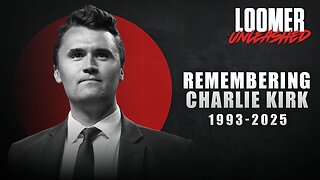Premium Only Content

Daydream Bleacher
Like the “Pleasure Doing Business” sketch, this sketch was inspired by James Thurber’s “The Secret Life of Walter Mitty,” except that in this skit, Dalton has no control of his daydream. It’s a very worrisome sign when you can’t control the fate of your own daydream. It appears that his family is made of stronger stuff than his co-workers at Tom Quixote Supermarket, as they don’t care to be thrust back in time to their younger, un-“Happy Days” to play supporting actors and actresses in Dalton’s very own 1970s situation comedy.
Voiceover and Caption: “October 21st…” - The day to which Doc Brown and Marty McFly travelled to in “Back to the Future Part II,” although they traveled to October 21st, 2015, not October 21st, 1975.
Voiceover and Caption: “…in a race against time to defend his family against the greatest enemy he has ever faced: Swiss Steak Night!” – A member of our troupe grew up in a household where once in a while (usually on Sundays), the dinner was Swiss Steak. Contrary to what the skit states, Swiss Steak actually has nothing to do with Switzerland. It’s called Swiss Steak because of the way it is prepared. “Swissing” refers to pounding or passing something through rollers in order to tenderize it. It’s often done to tougher cuts of meat (in this case, round steak) in order to make it more palatable and quicker to cook. Nevertheless, this troupe member still found it tough to swallow, literally speaking. While his mother is a good cook, he would chew on the Swiss Steak over and over and over again before it would finally be broken down enough so he could swallow it. Too much work for what is supposed to be a time to relax.
Mother: “Don’t repeat yourself, son. You sound like that Squire Allworthy from the ‘Tom Jones’ sketch.” - One of the things that annoys us here at CoBaD about sitcoms (particularly sitcoms of the 1970s) is when a favorite character walks in with a line, then gets wild applause (e.g., The Fonz from “Happy Days” or Lenny and Squiggy from “Laverne and Shirley”). When the applause finally dies down, the actor will sometimes say the initial line again, as if the audience, in their enthusiasm, had forgotten the character’s train of thought. From the other characters’ perspective (who are obviously oblivious to the applause), it sounds like the favorite character is simply repeating himself for no apparent reason. For more on Squire Allworthy, see the “Bundle of Workplace Comfort and Joy” sketch.
Dalton: “His name is Floyd McPatrick, and he has this car called a Mandalorian…” – For more on Floyd McPatrick, see the sketch “What’s New Is Old Again.”
Mother: “Don’t pause mid-sentence, Arthur. You sound like that redneck from the Picasso sketch.” - Another thing that annoys us about sitcoms in general (not just ones from the 1970s). A character will start his line with a joke, which gets a prolonged laugh halfway through his sentence. He pauses until the laughter dies down, then finishes his sentence, making him appear to the other characters (who are, again, unaware of the audience) as being lost in thought and rather dim-witted. It’s just about as irritating as an audience “aww”-ing every time a child appears on screen or utters a line. For more on Arthur, see the “I’m Gonna Rearrange Your Face” sketch.
Father: “…and behind the TV there’s nothing but a multiple-camera setup and a hand-picked 'live' studio audience that’s told what clothes to wear and submissively laughs on demand!” – Inspired by an article about the talk show “The View.” Studio audience members for the talk show were specifically selected based on the demographic the show wished to attract, and therefore had to look and behave in a certain way. Audience members were told in advance what to wear (bright colors, no solid blacks or whites, no tank tops, no t-shirts, etc.) and were told by the warm up comedian and the floor manager when to enthusiastically clap and cheer, while at the same time not reacting when they suddenly realized they were on camera. Anyone refusing to follow these orders was expelled.
Father: “Your flimsy strategy may work for a production of Mozart’s ‘Cosi Fan Tutte’ where all you have to worry about is taking a financial bath because you alienated your older season ticket holders because they want their 18th century costumes and scenery, and STILL couldn’t attract the younger crowd because they don’t want the 18th century music and libretto…” – A member of our troupe was a season ticket holder for a famous opera company. One year, the opera company held a minimalist production of Mozart's “Cosi Fan Tutte,” where the setting was moved forward from the 18th century to modern times (with an all-white backdrop in some scenes), with Despina wearing a white pants suit and drinking Starbucks coffee. The “financial bath” was actually referring to another victim of “relevancy” and “accessibility.” That same opera company’s production of Verdi’s “Rigoletto” the prior year moved the setting from the 16th century up to 1930s Italy. We think this production did poorly at the box office for the reasons stated by Arthur.
The sad thing is that these updates were unnecessary as both “Cosi Fan Tutte” and “Rigoletto” are “cash cows,” i.e., they are so well-written that they will sell tickets; they will bring in opera lovers. CoBaD is of the opinion that it’s when opera companies try to tinker with these masterpieces in order to attract a younger crowd that they “lose their shirts,” and not only fail to capture the younger audience they were shooting for, but also drive the older audience away.
Dalton: "...and parading around in striped pajamas in public!" - Dalton here is referring to the tricolor (yellow, blue and red) uniform of the Pontifical Swiss Guards (members of the Swiss Armed Forces who are assigned to keep order at the Vatican). A member of our troupe actually got a close up look at a replica of the uniform when he played a Swiss Guard in a production of Puccini's opera "Tosca." Presumably the Swiss Guards are assigned halberds in case someone makes fun of their uniforms.
Dalton: “Hang on, wait a second, I think lightning just struck the airport tower; I’m getting 5G coverage again.” - Just like the lightning striking the clock tower (representing time) propelled Marty McFly forward in time from 1955 to 1985, lightning striking the Television Airport tower (representing communication) propelled Dalton Sidney’s smart phone reception from 1975 (nonexistent) to the present day (5G). Dalton’s line is alluding to the (now resolved) debate on concerns that 5G deployment could interfere with an aircraft’s radar altimeter (a device that determines how close the aircraft is to the ground in low-visibility conditions) that operates close to antennas in 5G networks. The issue was ultimately resolved when aircrafts upgraded their altimeters.
Director: ”…and Scan to Computer…” - Since CoBaD uses drawings, we don’t say “print,” which is the director’s way of saying that the scene performed by live actors and actresses is good and is to be kept. Rather, we use the term “Scan to Computer” which is our way of saying that the drawing is good and ready to be electronically preserved.
Dalton: “Well, I guess Alvin isn’t ready for the gig economy yet. But his kids are gonna love it.” - Rephrasing of Marty McFly’s famous line from “Back to the Future” (1985) when Marty McFly was playing electric guitar at the school dance.
Voiceover and Caption: “'Daydream Bleacher' was preformed live on phlegm and taped to a light, stodgy old orifice.” – A spoof of the line spoken by Rob Reiner during the closing credits of “All in the Family:” “’All in the Family’ was recorded on tape before a live audience.”
Voiceover: “'Daydream Bleacher' has been brought to you by…Soft Summer Breeze Fan Company of Mount Washington, New Hampshire. Family owned and operated since 1927. We are SSBFC, where a soft breeze is always relative.” - In the background near the end of the skit were two people reenacting a scene from the 1952 musical “Singin’ in the Rain.” It was a parody of the “You Were Meant for Me” number sung by Don Lockwood (played by Gene Kelly) to Kathy Selden (played by Debbie Reynolds). In the scene, set in 1927, Donald takes Kathy to an empty Hollywood stage and tries to put her in a romantic mood by mimicking elements found in nature: a “beautiful sunset,” which is a backdrop backlit by stage lighting, “mist from a distant mountain,” which is a fog machine, “moonlight,” which is really a spotlight, a “soft summer breeze,” which is actually a wind machine, and so forth. Unfortunately, our Don Lockwood didn’t realize that the wind machine he was using was manufactured by the Soft Summer Breeze Fan Company of Mount Washington, New Hampshire. The joke here is that Mount Washington is the windiest place in the United States. Its top wind, recorded on April 12, 1934, was 231 miles per hour. It has an average annual wind speed of 35 miles per hour, with hurricane force winds (greater than 75 mph) about 100 days a year. So as you can imagine, a “soft summer breeze” is actually quite intense. Relatively speaking, of course.
References:
Donen, S. & Kelly, G. (Directors). (1952). Singin’ in the Rain [Film]. Metro-Goldwyn-Mayer.
Echazabal, T. (2012, December 5). The language of making movies. Videomaker. https://www.videomaker.com/article/c18/15653-the-language-of-making-movies/
Emilia, D. (2023, September 01). Airline fears around 5G may finally be over / Delta, the last holdout, has updated its airline equipment. The Verge. https://www.theverge.com/2023/9/1/23856099/delta-updates-airplanes-5g-interference
Lew, J. (2021, May 31). 10 of the Windiest Places in the World. Treehugger.com. https://www.treehugger.com/windiest-places-world-4869343
Jackson, V. (2020, March 5). Performing for no one – the important work of in-studio audiences. Yahoo! News. https://news.yahoo.com/performing-no-one-important-studio-130622513.html
Stacey (2011, August 18). Easy Swiss Steak. Southern Bite. https://southernbite.com/swiss-steak/
Zemeckis, R. (Director). (1985). Back to the Future. [Film]. Amblin Entertainment; Universal Pictures.
Zemeckis, R. (Director). (1989). Back to the Future, Part II. [Film]. Amblin Entertainment; Universal Pictures.
-
 LIVE
LIVE
Laura Loomer
3 hours agoEP143: Remembering Charlie Kirk (1993–2025)
2,215 watching -
 LIVE
LIVE
Man in America
6 hours agoCharlie Kirk’s Assassination—An URGENT WARNING for America
1,513 watching -
 1:22:15
1:22:15
Glenn Greenwald
5 hours agoCharlie Kirk Assassination Fallout: U.S. Reps Call for Censorship; Do Graphic Videos Serve the Public Interest? Plus: WIRED Reporter on the Dark Side of Surrogacy | SYSTEM UPDATE #513
125K120 -
 1:48:36
1:48:36
Right Side Broadcasting Network
11 hours agoLIVE: President Trump Attends the Yankees Baseball Game - 9/11/25
108K24 -

Badlands Media
5 hours agoBadlands Media Special Coverage - FBI Press Conference on Charlie Kirk's Assassination
81.3K8 -
 1:06:19
1:06:19
BonginoReport
6 hours agoManhunt Underway for Charlie Kirk’s Assassin - Nightly Scroll w/ Hayley Caronia (Ep.132)
236K156 -
 DVR
DVR
Flyover Conservatives
14 hours agoStructural Architect Destroys 9.11 Narrative... What Really Happened? - Richard Gage AIA | FOC Show
25.8K8 -
 LIVE
LIVE
Precision Rifle Network
9 hours agoS5E1 Guns & Grub - Charlie Kirk's "sniper"
224 watching -

LFA TV
17 hours agoLFA TV ALL DAY STREAM - THURSDAY 9/11/25
387K90 -
 1:01:56
1:01:56
The Nick DiPaolo Show Channel
7 hours agoDems + Media Killed Kirk | The Nick Di Paolo Show #1792
102K82